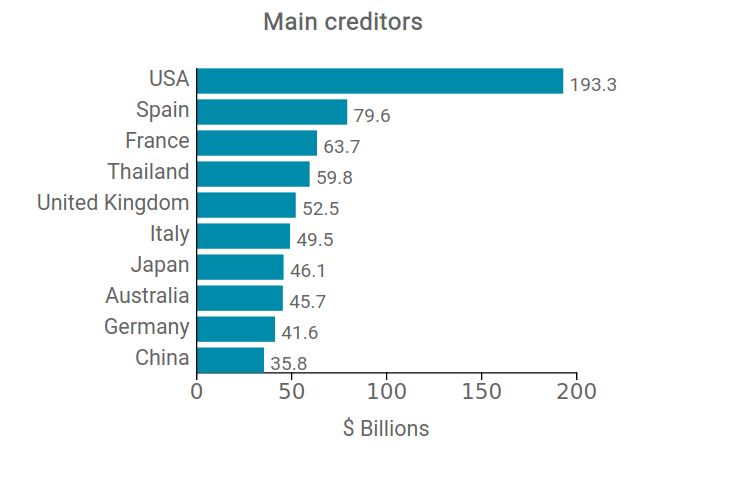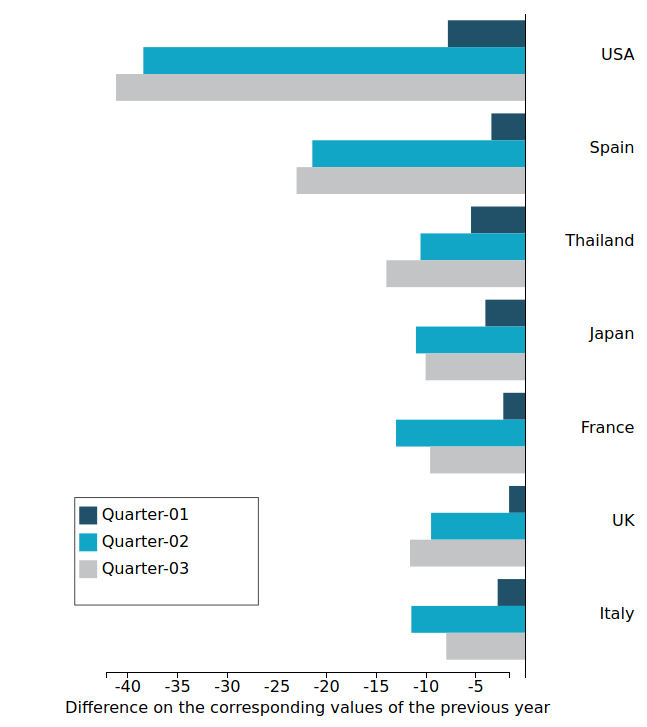2020: a bad year for global tourism
Balance of payments' data is key to quantifying drop in tourism services along 2020
Published by Lorenzo Fontanelli. .
Uncertainty Great Lockdown Covid-19 Eurozone Global economic trends
Tourism is certainly one of the sectors most affected by the pandemic and the ensuing ban on international travel. The World Tourism Barometer, published by the World Tourism Organization (UNWTO), estimates that in 2020 international tourist arrivals have plummeted by 74% with respect to the previous year, due to widespread travel restrictions and the resulting drop in demand.
An important measure that allows us to quantify the fall in tourism flows for different economies around the world is data on the balance of payments. In fact, all transactions made on the territory of a country by non-residents are registered under the Travel category as credits of the country. This section includes the goods and services purchased by travelers during their presence in the foreign country, first and foremost hotel or restaurant hospitality services.
In light of this, data by the International Monetary Fund becomes a useful tool for making some observations on the performance of the tourism sector of those economies for which it plays a significant role.
The following chart presents the main foreign creditor countries as to the Travel category.
Balance of Payments: Credits by "Travels" (2019)

Source: Export Planning
With more than $193 billion, the United States ranks first, followed by Spain ($79.6 billion), France ($63.7 billion) and Thailand ($59.8 billion). Italy ranks sixth.
Due to the travel restrictions put in place to contain the spread of the virus, the main creditor countried suffered the most significant losses in the first nine months of 2020. This chart analyzes the quarterly performance of the most adversely affected economies compared to the corresponding period in 2019.
Balance of Payments: Credits by "Travels" (bn $)
Quarterly difference (2019-2020)

Source: IMF
Looking at the graph, we can notice that the pandemic has severely hit all countries. Each has indeed experienced a drastic fall, though with different intensity.
United States and Spain show the most evident contractions, with decreases of respectively 38 and 21 billion dollars in the second quarter of 2020 compared to 2019 values.
For the Asian continent, Thailand and Japan suffered the most. However, while Thailand's decline intensified over the year, Japan's trend appears to show a somewhat weak reversal between the second and third quarter, yet failing to offset overall losses.
Finally, there are France, United Kingdom and Italy. As in the case of Japan, Italy and France recorded the most significant decline in the second quarter of the year, showing a slight recovery in the third. On the contrary, in the case of the US, Spain and the UK, the third quarter shows a further worsening trend.
Conclusions
The impact of Covid-19 on the economies of the most exposed countries has been and will continue to be significant. As a result of the pandemic, the tourism sector has suffered a dramatic contraction, though proportionate to the weight that this sector holds in the different economies. To gain a clear understanding, it is useful to analyze the historical trend over the last twenty years of receipts from tourism services, obtained by combining the receipts declared by each countrt.
Taking into account the strong seasonality that characterizes the series, the unprecedented drop suffered by international credits for Travels in the second quarter of 2020 is evident.
World: Credits by Travel Category (2000-2020)

Source: Export Planning Information System
.
The World Tourism Organization also forecasts a slow and gradual recovery of tourist flows for 2021, given an evolution of the pandemic that is still uncertain and highly dependent on the availability of the vaccine on a large scale. The activation and the strengthening of policies in support of tourism are increasingly considered as necessary prerequisites for a proper support to the sector.


